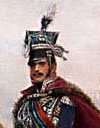 |
| Napoleon out of condition in 1815 |
For all its initial advantage, the French army had cause for concern in the shortcomings of certain senior commanders. Napoleon bears the full responsibility for this as he alone made the appointments to the key posts. At the age of 46, the Emperor should have been still in his prime; his mind was as alert as ever, but physically he was out of condition following a year of soft living on Elba, and the strains of the next seventy two hours were destined to mould and distort his judgement at crucial moments.
The very brilliance of his plan made it imperative that he should keep himself fully informed of events on all sectors, and in the days before wireless this inevitably meant many hours in the saddle. To a considerable extent, the shortcomings of his immediate subordinates aggravated this necessity. As chief of staff Napoleon had appointed Marshal Soult, and experienced army commander who had seen much service in Spain, but who had never before served in his present capacity. Berthier, the eminence grise of so many of the Grand Army's campaigns during the previous decade, had died on June 1, reputedly by jumping to his death from the upper story of a house at Bamberg, but even before this news came through the Duke of Dalmatia had been appointed to the senior staff position. Preeminently Soult was a man of action who would have been far better employed as commander of one of the army's wings -- especially against his old enemy Wellington. In the course of the following days, Soult was to be responsible for perpetrating several mistakes and misunderstandings in the written orders he issued, and these, taken together, account for a great deal of Napoleon's ultimate difficulties.
~ D. Chandler, The Campaigns of Napoleon, p. 1021






















































1 comment:
J.F.C. Fuller is even more critical of Soult's appointment as Chief of Staff. He also finds fault with other appointments, such as Davout as Minister of War, and Suchet commanding on the Cota d'Azur. Suchet held off superior numbers very ably, but I reckon he ought to have commanded the Left Wing of the Armee du Nord, with Davout on the right. Ney and Soult would have provided very experienced Corps commanders (if they could be trusted to obey the orders of the Wing commanders - not exactly a given!).
In my view, Ney might not have been a bad choice for the command given to Suchet - he demonstrated considerable skill commanding a rearguard in Spain as well as Russia. Soult also had a lot of experience commanding a protracted defence against superior numbers.
Maybe he could also have stretched a point and accepted Murat back into the fold as Cavalry Corps commander, though he had very able cavalrymen in Milhaud and Kellermann. The sticking point would have been who to place in command of the Imperial Staff.
Post a Comment